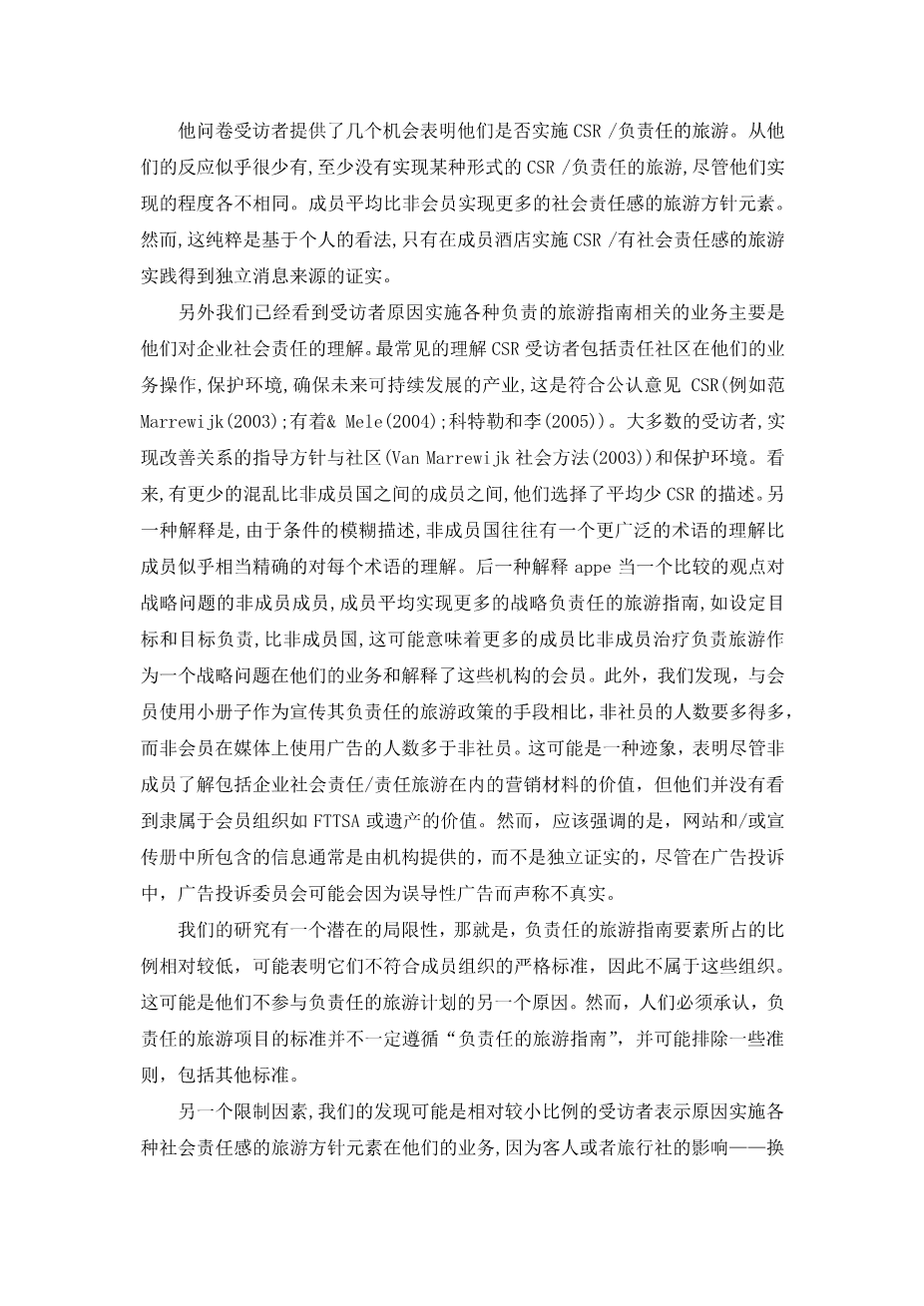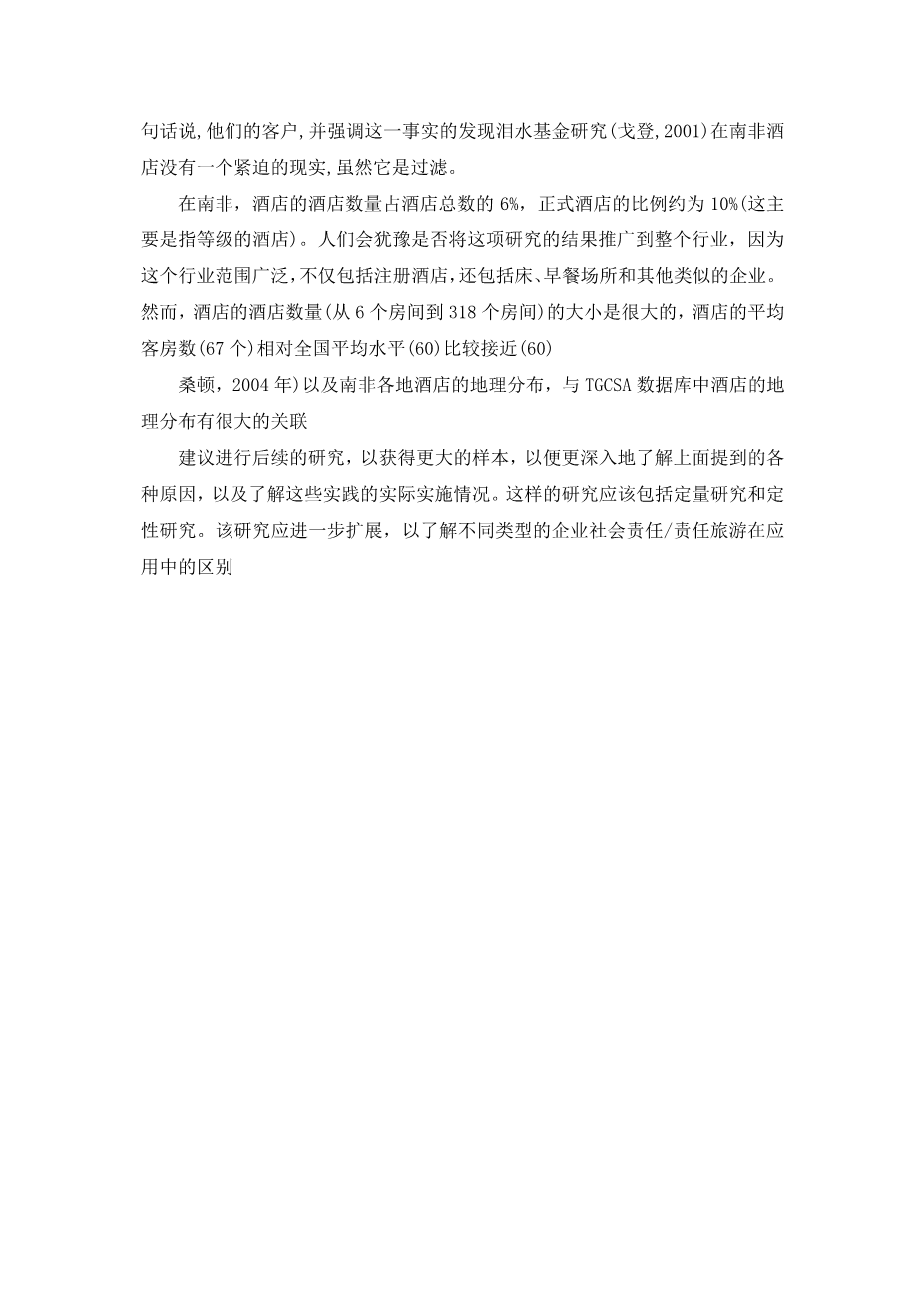An investigation into responsible tourism practices in the South African hotel industry
M. v.d. Merwe and A. Wocke[1]
Gordon Institute of Business Science, University of Pretoria,
PO Box 787602, Sandton 2146, Republic of South Africa wockea@gibs.co.za
Received November 2006
This paper sheds light on the reasons for the limited uptake of responsible tourism initiative memberships by hotels in South Africa, despite South Africa being regarded as a leader in the field of responsible tourism policy, with the drafting of responsible tourism guidelines by the South African Department of Environmental Affairs and Tourism (DEAT). The International Centre for Responsible Tourismrsquo;s conference (hosted in South Africa) preceding the World Summit on Sustainable Development in 2002 resulted in the Cape Town Declaration, which was based on the guidelines developed by DEAT. There are currently two responsible tourism membership initiatives in South Africa. Non-experimental survey research was conducted among hotels about their understanding and implementation of responsible tourism practices. Sixty hotels responded to the survey, and it would appear that these hotels implement Corporate Social Responsibility/responsible tourism, though to varying extents. Many responding hotels do not participate in responsible tourism initiatives because of - amongst others - confusion about what the concept means, and a lack of awareness of such initiatives. This paper raises questions about the effectiveness of membership initiatives in promoting the implementation of responsible tourism practices and questions the importance of a common understanding and awareness of what responsible tourism entails in ensuring that policy is implemented.
Introduction
South Africa is faced with widespread unemployment and poverty and it is widely believed that the tourism industry can make a significant contribution to addressing these problems (e.g. Ashley, Roe amp; Goodwin, 2001). Tourism is seen as a high-impact industry on the environment within which it operates and is regarded as the largest industry worldwide (World Travel and Tourism Council (WTTC), IFTO, IHamp;RA, ICCL amp; UNEP, 2002). The importance of responsible tourism was highlighted at the Earth Summit in Rio de Janeiro in 1992 with Agenda 21 and the Rio Declaration, which articulated the main principles for sustainable development in the 21st century (WTTC et al., 2002). A comprehensive and useful definition of the term responsible tourism is that of the South African Department of Environmental Affairs and Tourism (DEAT), which defines the term as lsquo;tourism that promotes responsibility to the environment through its sustainable use; responsibility to involve local communities in the tourism industry; responsibility for the safety and security of visitors and responsible government, employees, employers, unions and local communitiesrsquo; (DEAT, 1996:4).
Despite the global focus on the tourism industry as part of the sustainability agenda at World Summit on Sustainable Development (WSSD), there seem to be very few tourism companies participating in globally responsible tourism or Corporate Social Responsibility (CSR) initiatives such as the Global Compact (tourism companies only represent 2% of all companies participating in the voluntary initiative). Research amongst UK-based tour operators (Gordon, 2001) found that these tourism companies have been very slow in implementing socially responsible tourism principles in their businesses and there is little evidence that South Africa is different.
Aims and contribution of the study
This study aims to shed light on the reasons South African hotels adopt or ignore CSR/responsible tourism initiatives, despite government policy and a growing global awareness of the concept. We are guided by the following research questions:
- What is the extent of CSR/responsible tourism in the South African hotel industry?
- What is the understanding of the concepts of CSR/responsible tourism in the industry?
- Do government policy and membership of tourism bodies promote or advance the adoption of CSR/responsible tourism practices?
- Is the business rationale for the adoption of CSR/responsible tourism well understood by the South African hotel industry?
- How important is membership of tourism bodies to the promotion of CSR/responsible tourism?
A deeper understanding of the nature of CSR/responsible tourism practices by the South African hotel industry and an understanding of the role of government and tourism bodies in the South African hotel industry will support policy and private sector initiatives to expand and entrench responsible tourism practices in South Africa. Additionally the study will fill an important gap in the literature on the motives of hotels in adopting CSR and guide further research in this vital area of the economy.
The South African hotel industry
The accommodation sector forms a significant part of the tourism industry in South Africa and can be regarded as integral to any tourism initiative. This study focuses on hotels only as they are the most developed sub-sector of the accommodation sector and as a result are the most organised sector in the industry. This study included all hotels in all the provinces of South Africa. A hotel is defined by the Tourism Grading Council of South Africa (TGCSA) as an establishment that lsquo;provides accommodation to the travelling public, has a reception area and offers at least a lsquo;breakfast roomrsquo; or communal eating area,(TGCSA, 2002). In total, there are approximately 11,000 accommodation establishments, including hotels, self-catering establishments,
剩余内容已隐藏,支付完成后下载完整资料


英语译文共 2 页,剩余内容已隐藏,支付完成后下载完整资料
资料编号:[613775],资料为PDF文档或Word文档,PDF文档可免费转换为Word
课题毕业论文、开题报告、任务书、外文翻译、程序设计、图纸设计等资料可联系客服协助查找。
您可能感兴趣的文章
- 饮用水微生物群:一个全面的时空研究,以监测巴黎供水系统的水质外文翻译资料
- 步进电机控制和摩擦模型对复杂机械系统精确定位的影响外文翻译资料
- 具有温湿度控制的开式阴极PEM燃料电池性能的提升外文翻译资料
- 警报定时系统对驾驶员行为的影响:调查驾驶员信任的差异以及根据警报定时对警报的响应外文翻译资料
- 门禁系统的零知识认证解决方案外文翻译资料
- 车辆废气及室外环境中悬浮微粒中有机磷的含量—-个案研究外文翻译资料
- ZigBee协议对城市风力涡轮机的无线监控: 支持应用软件和传感器模块外文翻译资料
- ZigBee系统在医疗保健中提供位置信息和传感器数据传输的方案外文翻译资料
- 基于PLC的模糊控制器在污水处理系统中的应用外文翻译资料
- 光伏并联最大功率点跟踪系统独立应用程序外文翻译资料



